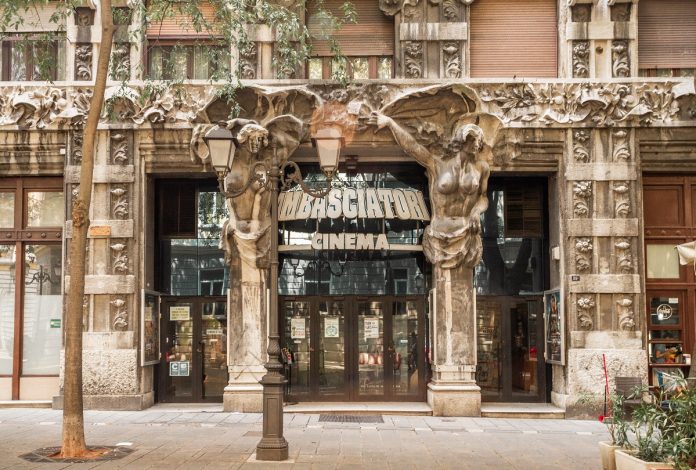by InTrieste
One of Europe’s most anticipated film festivals celebrating Ibero-Latin American cinema is back in full swing. The XXXIX edition of the Ibero-Latin American Film Festival in Trieste brings an array of stories, spanning eras, continents, and genres.
With a packed schedule of screenings, retrospectives, and conversations with directors, this year’s festival continues to highlight a broad spectrum of themes from historical reflection to deeply personal narratives.
Among the most talked-about events is the screening of Org, a cult film by Fernando Birri, produced by the legendary Italian actor Terence Hill. Shot in 1968 and based on Thomas Mann’s novella The Severed Heads, Org tells the story of a love triangle but took over a decade to edit. The film, composed of more than 26,000 cuts and 700 audio tracks, was described by the Barcelona Center for Contemporary Culture as a “collage of excess, humor, and experimentation.” Despite being presented at the Venice Film Festival in 1979, Org was never distributed—by Hill’s own choice—until now. The screening in Trieste marks the film’s first public showing in Italy in 45 years.
The festival also delves into Latin America’s complex relationship with its own independence. La independencia inconclusa by Chilean filmmaker Luis R. Vera reflects on how far the continent remains from the ideals of freedom envisioned by its liberators. This co-production between several Latin American nations invites viewers to critically assess 200 years of republican history through the voices of contemporary progressive leaders.
In the afternoon, the competitive section of the festival kicks off with the Chilean-Italian-Swedish production Bastardo. La herencia de un genocida. The film follows a young Chilean man living in Italy who returns to his homeland only to discover his father’s involvement in the brutal repression under Pinochet. A further twist comes when the protagonist reveals his homosexuality, triggering an even deeper familial conflict. The festival continues with Abel Peñalba’s documentary Arquitecto de paz, which explores the life of Carlos Saavedra Lamas, the first Latin American to win the Nobel Peace Prize for his efforts in negotiating peace between Paraguay and Bolivia in 1935.
By evening, the festival shifts its focus to female-centered stories. Peruvian filmmaker Augusto Tamayo’s La herencia de Flora offers a powerful portrait of Flora Tristán, the Franco-Peruvian feminist and activist whose work in the 19th century laid the groundwork for many of today’s women’s rights movements. Later in the evening, Colombian filmmaker Nina Marín presents Tierra quebrá, a harrowing tale of a woman returning to her violent rural homeland, only to be confronted with the tragic death of her eldest son. Marín will discuss the film with the audience following the screening.
The day concludes with Mariano González’s Adulto, an Argentine feature examining the turbulent transition from adolescence to adulthood. The story follows Antonio, a 14-year-old boy living with his father in Buenos Aires. When his father dies in a motorcycle accident, Antonio embarks on a journey to uncover the truth, symbolizing the often painful rites of passage into adulthood.
In parallel with the dramatic offerings, the festival also pays homage to Latin America’s musical heritage. Juan Pin Vilar’s documentary La Habana de Fito captures the spirit of Cuba’s capital city through the eyes of Fito Páez, an iconic figure in Argentine rock music. Páez reflects on his relationship with the country, its music, and its complexities. The evening’s musical journey continues with San Pugliese, a documentary about the life of Osvaldo Pugliese, Argentina’s beloved tango composer and conductor, revered as “San Pugliese” for his lasting cultural legacy.
Tickets for the festival, now available for purchase through Vivaticket, have seen brisk sales. With a comprehensive program offering insights into the history, politics, and culture of Latin America, the festival promises to maintain its status as a critical hub for Ibero-Latin American cinema. More information is available on the festival’s website, cinelatinotrieste.org.
Cultural Roots and Political Reflections
The Ibero-Latin American Film Festival not only showcases cinematic artistry but also provides a platform for exploring critical socio-political issues. Films like La independencia inconclusa and Bastardo serve as poignant reminders of the complex legacies that still resonate across Latin America. Meanwhile, the festival’s commitment to elevating women’s voices is evident in its robust lineup of female-driven narratives.
With themes ranging from dictatorship to family bonds, from personal identity to national history, the festival’s films offer more than entertainment—they encourage audiences to reflect on the struggles and resilience of Latin American societies.
As the XXXIX edition unfolds, Trieste reaffirms its role as a cultural bridge between Europe and Latin America, inviting viewers to immerse themselves in stories that span both continents and centuries.





























